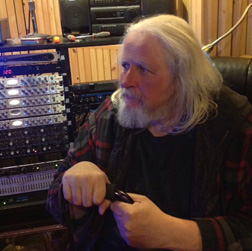 Phil Greene
Phil Greene
Before he joined the Boston-based band Swallow in 1971, Phil Greene, of Narragansett, had already spent a decade honing his craft and was considered one of the finest guitarists in southern New England. After two albums for Warner Brothers, they disbanded and Phil decided to move behind the desk. He opened his first studio in Providence in 1974 and his reputation as a producer and engineer grew rapidly. In 1976, he became a partner at Normandy Sound in Warren where his career exploded. By the end of the 1980s, he’d become one of the most succesful people in Rhode Island music history with 27 Gold and Platinum album awards. He has placed eleven songs into Billboard’s Top Ten including two #1’s with New Kids On The Block and another with Tommy Page; he has four multi-Platinum album credits with New Kids and one with John Cafferty & The Beaver Brown Band; and has two Grammy nominations with Roomful of Blues. More than 200 international releases bear his credit as producer, engineer, mixer, guitarist or vocalist including recordings by Mick Jagger, Keith Richards, Ringo Starr, Herbie Hancock, Peter Wolf, Buddy Guy, Steve Earle, Bob Weir, Parliament and dozens of others. At the time of his induction into the Hall of Fame, he had just enjoyed a #1 on the Hot Singles Sales chart with “Heaven 24/7” by R&B legends Tavares.
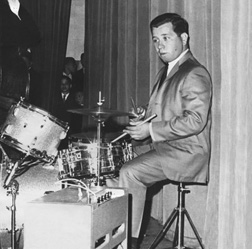 Artie Cabral
Artie Cabral
Born in Providence in 1940, Artie Cabral is a world-renowned jazz drummer and a dedicated music educator. He began his career in 1956 and spent two decades touring the world with a host of jazz masters including Stan Kenton, Junior Mance, Dakota Staton and Mel Torme. In 1969, he joined Woody Herman’s Seventh (and final) Herd which included backing R&B great Dionne Warwick. Along with bassist Bob Petteruti, he was a member of pianist Mike Renzi’s trio which served as the house band at the Kings & Queens in Pawtucket in the 1960s and Allary in Providence in the 1970s backing the guest artists including Blossom Dearie, Mose Allison, Johnny Hartman and Phil Woods. His discography includes recordings with Ben Webster, Carol Sloane, Charlie Mariano, Toshiko Akioshi, Gray Sargent, Greg Abate and Herb Pomeroy. He holds a BA from Berklee and has taught in the Pawtucket Public School System, served on the faculty of Berklee and the Rhode Island School of Music, founded the R.I. School of Performing Music with trombonist Hal Crook, and, in private instruction, has mentored dozens of New England’s finest drummers. Since 1998, he has served as President of the Providence Federation of Musicians.
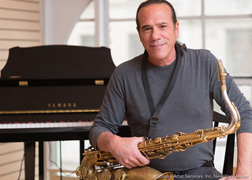 Dan Moretti
Dan Moretti
By the time “Some Time Inside,” his first album as a leader, was picked up by Blackhawk Records for international release in 1985, saxophonist Dan Moretti, of Narragansett, had already established himself as a world-class player in both Jazz and R&B. He was co-owner of Celebration Sounds recording studio in Pawtucket where he became recognized as a top-notch producer and engineer. As a recording artist, he has released 17 best-selling and critically-acclaimed albums as a leader and tours the world. As a sideman, he has performed and/or recorded with some of music’s biggest stars including Ray Charles, Aretha Franklin, The Four Tops, The Temptations, Robert Plant, Kid Rock, Dr. John, Dave Liebman, The Crusaders, and Nile Rodgers & Chic. He began teaching in the mid-1970s in Providence and in 1996 accepted a position at the Berklee College of Music where he is a Professor teaching Ensembles and Contemporary Writing and Production. He has created curriculum for Berklee and has published several books on composition, arranging and recording and presents seminars around the world including Europe, South America and Africa.
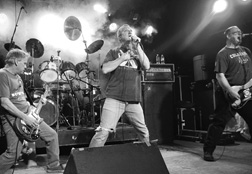 Neutral Nation
Neutral Nation
In 1982, bassist Steve Lepper, guitarist Dave Chabot, vocalist Mike “Dexter” Yarworth and drummer Johnny Cote formed the punk band Neutral Nation in the suburbs of Attleboro, Massachusetts. Inspired by ’70s punk, the newly emerging DIY scene, and kids starting their own bands they thought, “Why not us?” They exploded onto the Rhode Island scene via a series of shows at The Living Room in Providence appearing with national acts including G.G. Allin and The Minutemen. In 1985, with a new bass player, Tom “T-Buck” Buckland, they released their first record, the 7 song EP “Invasion of the Sumo Wrestler” and were hailed by College Music Journal as the “Best Unsigned Band” of 1986. Their first album, “It’s A Bash,” followed in 1987 and it is now nationally recognized as one of the great recordings of hardcore punk. With new drummer Mike “Stumpy” Neckritz on board, the band hit the road touring throughout the Northeast and Canada as headliners and opening for kindred spirits such as The Bad Brains, The Ramones and The Replacements. In 1992 they recorded “Don’t Get Hurt” and undertook their first West Coast tour where crowds erupted into mosh pits 2000 strong and merch tables were wiped clean solidifying the band’s position on the national scene. The band continues to perform and record and their 2004 self-titled, career-spanning anthology and the 2010 documentary “It’s A Bash: A story about being in a band” have introduced new generations to the power and glory of punk.
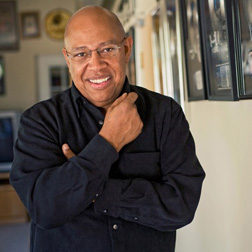 Billy Osborne
Billy Osborne
When 16-year-old Providence drummer Billy Osborne arrived in Manhattan in 1959 to join the Jimmy Giuffre Quartet, his impact on the heart of the Modern Jazz scene was immediate. He was named Metronome magazine’s Best New Drummer before his first recording session and spent a decade performing with the legends of the era including Wes Montgomery and Archie Shepp and he was one of John Coltrane’s favorite drummers. In 1969, he moved to L.A. establishing himself in the R&B field as musical director for The Friends of Distinction and as the composer of “Check It Out,” the first hit for his Rhode Island pals Tavares. In 1974, his brother Jeffrey’s band, Love Men Ltd., joined Billy in L.A. where they combined forces to become L.T.D. with Billy on keyboards, Jeffrey on drums and the two sharing lead vocals. By 1976, they were at the top of the Billboard charts with “Love Ballad” (#1 R&B, #20 Hot 100). After moving Jeffrey out front, L.T.D. mined Gold and Platinum for the next four years with a string of hits including two more #1 singles, “Back In Love Again” and “Holding On.” In 1980, Billy moved into production and helped launch Jeffrey’s solo career. In 1990, he signed with Ray Charles and became his right-hand man, writing, arranging and producing for “The Genius” until Ray’s passing in 2004.
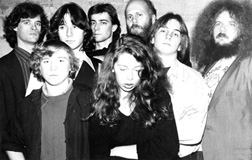 Plan 9
Plan 9
Vocalist/guitarist Eric Stumpo founded Plan 9 in 1979 while teaching at the String Instrument Workshop in Wakefield. Students and friends who hung around the store including his life-partner, organist/vocalist Deborah DeMarco, rehearsed ‘60s Garage Rock and Psychedelic covers there. The band’s long touring and recording career began soon after rehearsal tapes were sent to Greg Shaw of Bomp Records resulting in their first single, “Can’t Stand This Love, Goodbye” in 1981 followed by the Frustration EP on Bomp subsidiary Voxx. Shaw sponsored tours which led to their Manhattan debut at The Peppermint Lounge. Three indie albums followed establishing them as pioneers of Neo-Psychedelia and forerunners of the Paisley Underground. In 1985, they signed with Enigma/Pink Dust Records whose distribution deal with Capitol/EMI propelled them into the international market for a three-album run beginning with the landmark LP “Keep your Cool and Read the Rules.” In a 2010 online article, “Artist of the Week: Plan 9,” Reverend Matt commented that “…the layering of anywhere between three and five guitars and the interweaving of Deborah DeMarco’s swirling organ lines” demonstrates that “…the whole is far greater than the sum of its parts,” bringing “the listener’s mind to the outer limits of psychedelia.”
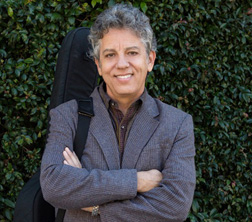 Frank Potenza
Frank Potenza
After graduating from the Berklee College of Music in 1972, Providence jazz guitarist Frank Potenza launched parallel careers as a performer and an educator appearing regularly with the area’s top jazz and blues artists and teaching at the Rhode Island School of Music. He moved to California in 1980 and quickly established himself on the West Coast scene performing and/or recording with a “who’s who” of jazz greats including his mentor, Joe Pass, and legendary pianist Gene Harris and teaching at Long Beach City College. His career skyrocketed after signing with TBA Records in 1986. His first four albums hit Billboard’s Contemporary Jazz chart with two, “Sand Dance” and “Soft & Warm,” reaching the Top Ten. At the time of his induction into the Hall of Fame, Frank remains a dedicated music educator and is Chair of the USC/Thornton Jazz Guitar Program. His latest album, “For Joe” – his homage to Joe Pass – received a four star review in Downbeat.
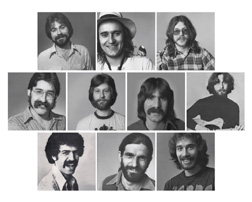 Rizzz
Rizzz
In 1973, guitarists David Tanury and Jim Tait and drummer Rick Couto of the Riverside underground band Powerhouse joined forces with saxophonist Bob Weisberger, Joe “Klem” Klimek on harmonica and sax, and bassist Kenn Reynolds to form a new band which is considered one of the finest and most sucessful in Rhode Island music history – RIZZZ. Their repertoire combined original songs by Dave and Jim with the Soul/R&B, Jazz and improvisatory elements found in Jam Band Music (Santana, the Dead, the Allmans) and Roots Music/Americana (The Band, Little Feat, NRBQ) before either of those genres had a name and they hit upon a unique style which immediately struck a chord with the public. They began selling out the biggest clubs in the state and were soon joined by pianist Jerry Xavier. After a shakeup in 1978, David, Klem and Kenn were joined by three new players, keyboardist Paul Sauvageau, guitarist Richard Herzog and drummer Gary St. Germain. The new lineup didn’t miss a beat and leaned even more heavily towards originals by David, Klem and Richard. Although Rizzz became a major college draw and showcased all over the Northeast, a record deal failed to materialize and they called it quits in 1981. However, their no compromise approach became a template for the exploding R.I. original music scene of the 1980s and their influence is still felt 35 years after they disbanded.
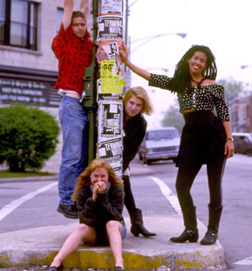 Throwing Muses
Throwing Muses
On the strength of two well-received indie releases - an EP and a cassette which spun off a major college radio hit - Rhode Island’s Throwing Muses were signed to the prestigious UK label 4AD in 1986. Stepsisters Kristin Hersh and Tanya Donelly, both guitarists and songwriters, formed the group in high school with bassist Leslie Langston and drummer David Narcizo, Hersh emerging as the band’s principal composer. Their post-punk sound and songs were hailed as highly original and the album was a critical success. The next three records, “House Tornado,” “Hunkpapa,” and “The Real Ramona” (with Fred Abong) continued the streak, then in 1992, Kristin, Leslie and David released “Red Heaven” as a trio. Bernard Georges joined as bassist for the Muses’ most successful albums, “University” and “Limbo,” and this lineup remains to this day. The Muses’ most recent release at the time of their induction was 2013’s groundbreaking book/CD, “Purgatory/Paradise.” Throwing Muses are considered pioneers – and their recordings considered milestones – in the development of the genre which became known as Alternative Rock.
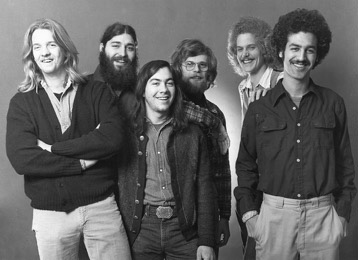 The Wild Turkey Band/Hometown Rockers
The Wild Turkey Band/Hometown Rockers
In 1975, guitarists John Baldaia and Paul Gaudette, bassist Pat Davis and drummer David Bottai formed The Wild Turkey Band in Pawtucket with one goal in mind: to play their own kind of music. Their rootsy repertoire (Van Morrison, the Dead, Reggae, Blues) proved a hit. By 1977, they were on top of the scene and added Russ Lema on keyboards. In 1978, after Eric North replaced Lema on keys and they added Peter Hadden on sax, the band introduced originals by John, Paul and Peter into the mix and their fan base soon covered the entire Northeast. In 1980, John left the group to pursue a career in jazz and was replaced by singer-songwriter Tom Keegan. Along with a seamless transition to a leaner, harder sound came a new name, Hometown Rockers. They became an all-original act and after an indie single caught the attention of the major labels, the band began looking for a producer. In stepped Kevin Falvey of Warner Bros. recording artists American Standard Band who not only produced a great album, but joined the band as well. Despite brisk sales, good airplay and great reviews, the band did not get picked up. Tom and Eric left in 1984 and a final lineup featuring vocalists Debbe Lewis and Celeste Crosse carried on successfully until 1986. The stick-to-your-guns attitude and great success of both incarnations of the band set the bar high and influenced countless musicians as pioneers in the musical genres which are now called Jam Band Music and Americana.

